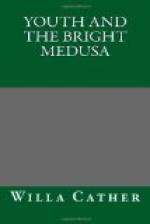After supper Cressida told me his story. His parents, both poor musicians,—the mother a singer—died while he was yet a baby, and he was left to the care of an arbitrary uncle who resolved to make a priest of him. He was put into a monastery school and kept there. The organist and choir-director, fortunately for Blasius, was an excellent musician, a man who had begun his career brilliantly, but who had met with crushing sorrows and disappointments in the world. He devoted himself to his talented pupil, and was the only teacher the young man ever had. At twenty-one, when he was ready for the novitiate, Blasius felt that the call of life was too strong for him, and he ran away out into a world of which he knew nothing. He tramped southward to Vienna, begging and playing his fiddle from town to town. In Vienna he fell in with a gipsy band which was being recruited for a Paris restaurant and went with them to Paris. He played in cafes and in cheap theatres, did transcribing for a music publisher, tried to get pupils. For four years he was the mouse, and hunger was the cat. She kept him on the jump. When he got work he did not understand why; when he lost a job he did not understand why. During the time when most of us acquire a practical sense, get a half-unconscious knowledge of hard facts and market values, he had been shut away from the world, fed like the pigeons in the bell-tower of his monastery. Bouchalka had now been in New York a year, and for all he knew about it, Cressida said, he might have landed the day before yesterday.




